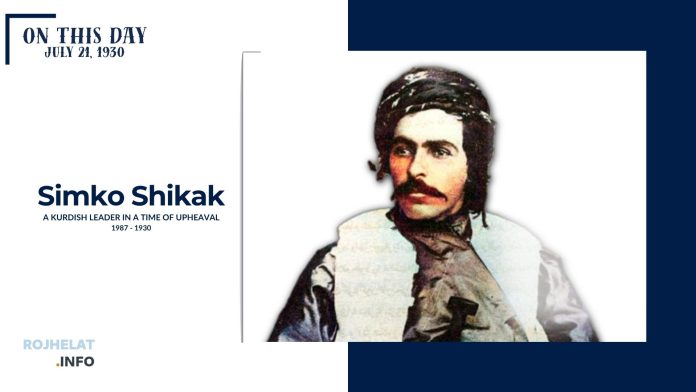On this day in 1930, Simko Shikak—one of the first Kurdish leaders to challenge state power for Kurdish rights—was assassinated.
At the dawn of the 20th century, the collapse of the Ottoman and Qajar empires and the emergence of modern nation-states in the Middle East brought deep political and social transformations to Kurdistan as well. During this critical period, individuals such as Ismail Agha Shikak, also known as Simko, emerged as leaders. These individuals balanced tradition and modernity, as well as tribal loyalty and national ideals.
Simko was born in 1887 into an aristocratic family of the Shikak tribe in the Salmas region. At the time, the Shikak tribe was one of the most powerful in Rojhelat (Eastern Kurdistan). After his father and brother were killed in clashes with the Ottoman and Qajar states, Simko was forced to assume leadership of the tribe at a young age. This marked the beginning of a path that started with defending tribal borders and eventually led to open rebellion against the central government.
One of the most notable aspects of Simko’s character was his political intelligence during a time of chaos. While Iran’s central government was weak and foreign powers (the Ottomans, Russians, and British) dominated the region, Simko built tribal alliances, mobilized armed forces, and took control of large parts of Rojhelat Kurdistan.
He was not merely a military commander but also a strategic political thinker. His correspondence with the Russians and Ottomans, his attempts to create local administrative structures in the territories under his control, and his use of media, including newspaper publishing, all indicate that he was more than a tribal chief. He was concerned with achieving a form of Kurdish autonomy or at least self-rule.
From the perspective of Kurdish society, Simko was one of the first to turn the ideas of independence and political identity into concrete actions. He raised the Kurdish flag, mobilized tribal forces around a supra-tribal vision, and used the Kurdish language in official correspondence.
In Kurdish collective memory, Simko is seen as a symbol of bravery, strength, and resistance. Despite limitations, he made a genuine effort to lift Kurds out of political marginalization. Unlike other local leaders who focused solely on preserving their tribes, Simko sought to create a new political order in Rojhelat Kurdistan—one in which Kurds could shape their own future.
Simko Shikak was a product of a turbulent era—a tribal leader who took great risks to fight for a different future for his people. One of Simko’s most important qualities was undoubtedly his ability to organize tribal power and convert it into a political force. At a time when most local leaders focused solely on their own tribe’s survival and interests, Simko tried to unite various Kurdish tribes around a shared goal. By forming military coalitions, establishing local governance, and employing symbols such as the Kurdish flag and language, he helped lay the groundwork for a political Kurdish identity. Though his influence was limited to a specific region, he took the first steps beyond tribalism toward Kurdish autonomy.
Another one of Simko’s positive qualities was his courage and political independence in the face of foreign powers and the central government. Unlike many leaders who quickly surrendered to state pressure or relied entirely on external support, Simko maintained his independence for a long time, resisting the Iranian army and foreign interventions. His political decisions demonstrated that he was not merely a pawn in the games of others, but rather a strategic actor attempting to shape the destiny of his people. This quality set him apart from his contemporaries and turned him into a model of resistance.


